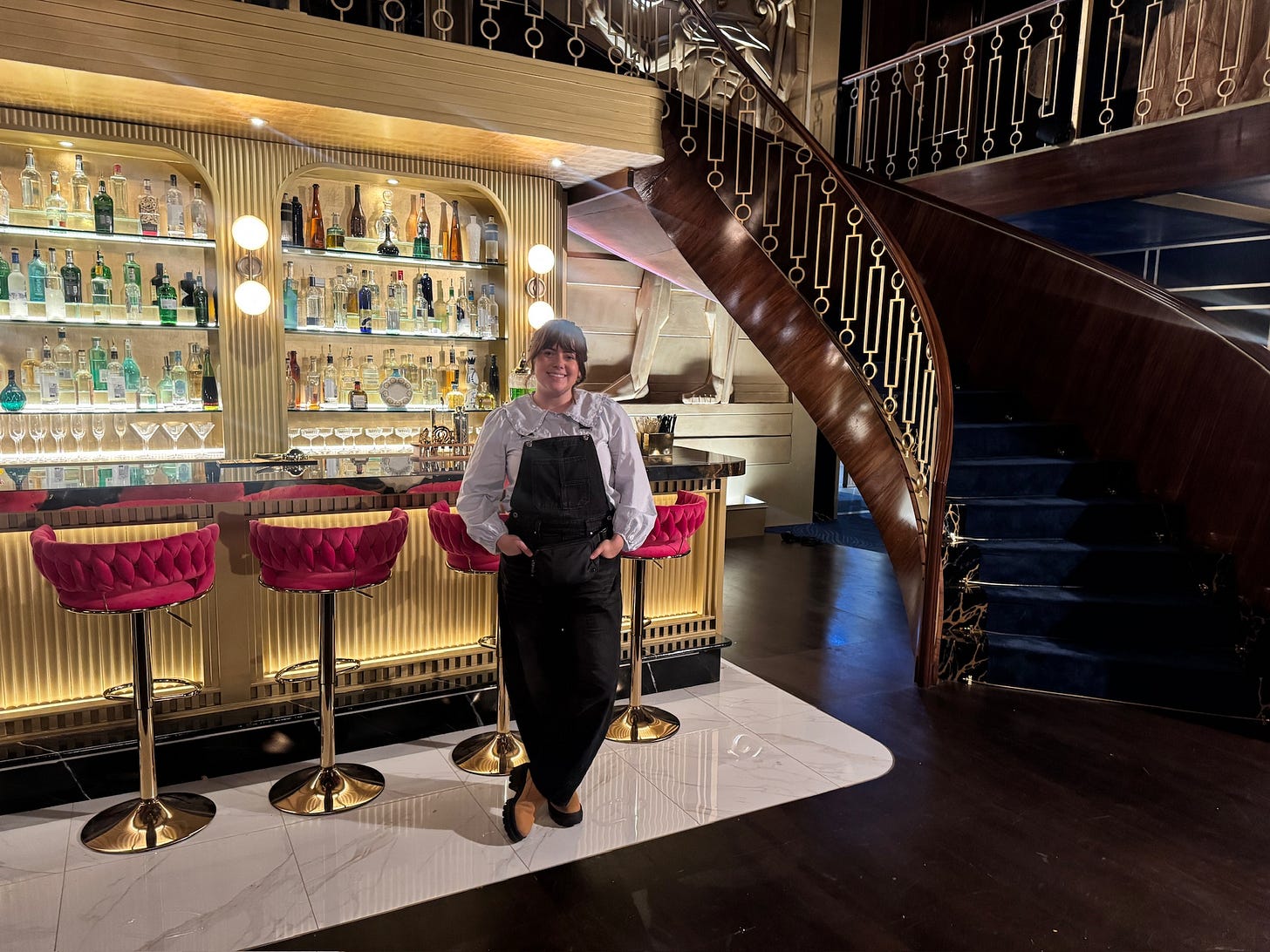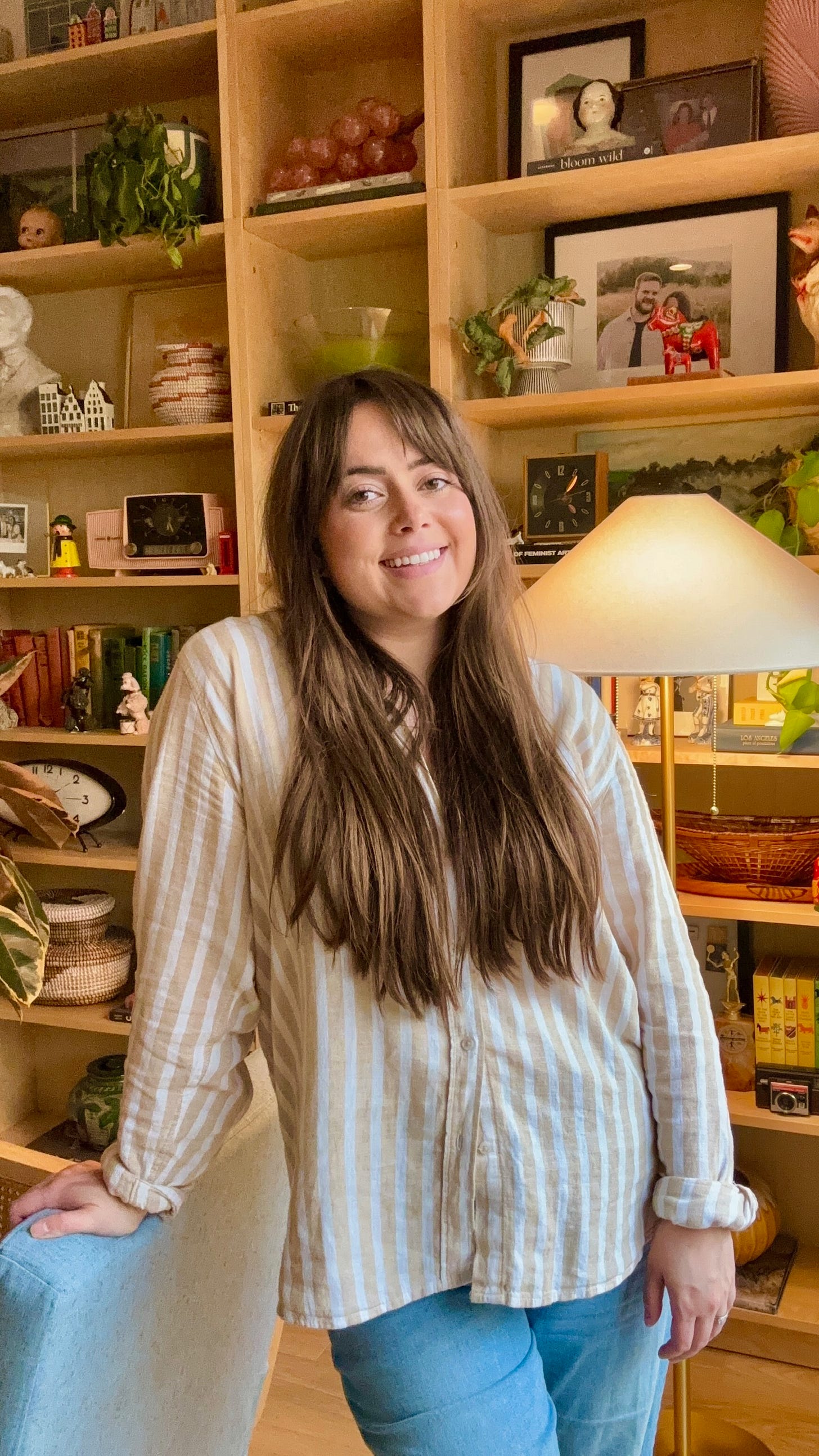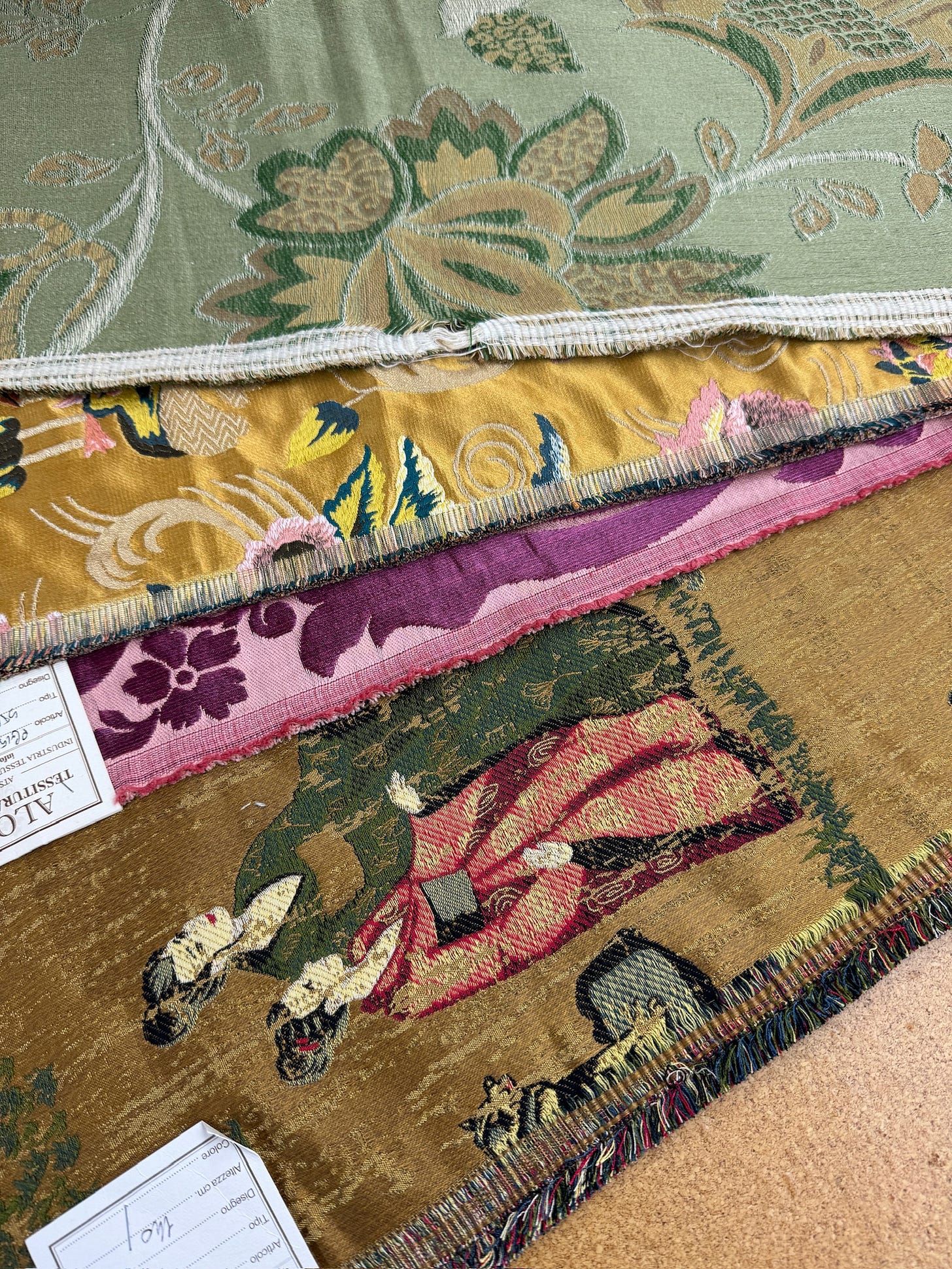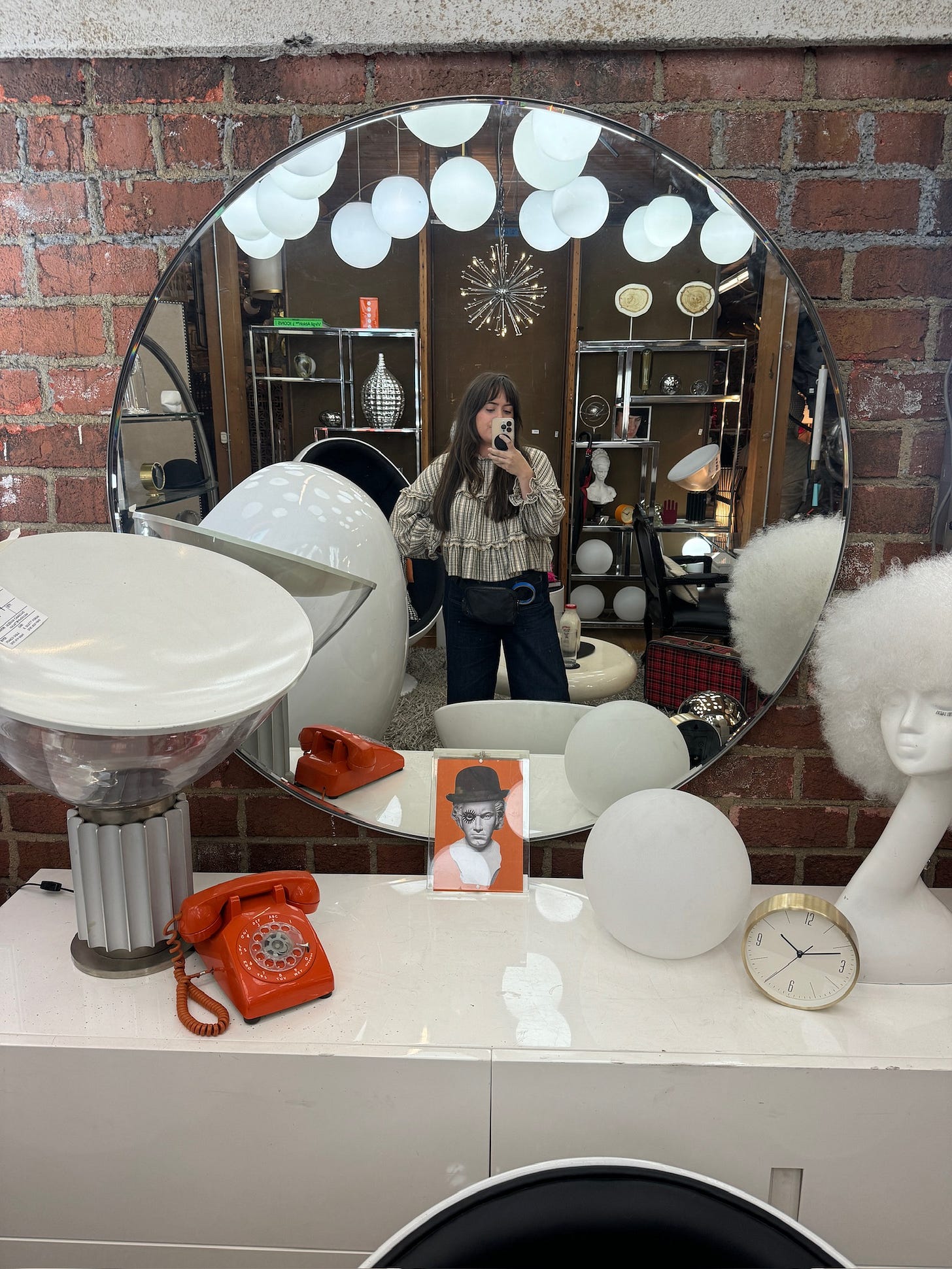Q&A with Shannon Sweeney
I interviewed a production buyer who’s shopped for shows including "A Man on the Inside," "Doctor Odyssey," and "The Santa Clauses."
Every single item that appears in a TV show or movie is there by design, whether it’s the couch the actors sit on or the picture frames hanging on their wall. The set decorator decides what those pieces are, and the production buyer makes sure those items show up on set. Like so many responsibilities in film, it’s invisible to the average person but absolutely crucial to a successful production—can you imagine Friends without that iconic couch, or The Godfather without those heavy hardwood desks and chairs, or a Wes Anderson film without those perfectly palleted pieces of furniture and set dressing? That’s why I was thrilled to interview Shannon Sweeney about her experiences as a buyer. From the prop house to the heart of production, it was fascinating to learn about the amount of thought and effort that goes into every scene. You’ll never look at the background of a television show the same!
Tell me a bit about what you do for a job! Some might say shopping for a living is a dream come true.
For me, it literally is! I love shopping, so it is the perfect dream job for me. But it's a lot more than just shopping. I'm a buyer for set dec for TV and film, and my job is to work with the set decorator. So the set decorator will communicate to me the needs and the plans of a set, like “We need a couch here, and we need a TV here, and we need a chair here.” And so my job is just to interpret what the decorator needs as far as style goes and make sure we have it.
Sometimes things are really specific in terms of what they need, style-wise. And sometimes it's just, “Here's an image” or “I kind of want something in this vein.” And then my job is to go out to the prop houses or shop online or shop at thrift stores and find those things.
That's so cool. What production are you working on right now? And what are some of the particular challenges of this show?
I just started on season 2 of A Man on the Inside. Everything has to be old and scratched up a little bit. There's character in it; each piece really tells the story of this place and the people who live there. [A Man on the Inside] is like a three month show, so we're just doing 99% rentals. But the difficult thing with rentals is dealing with other shows in production. When I go to the prop house and I see something good, I’ll tag it for the set decorator, like I’m staking my claim on something. But there are a couple shows right now going on who are doing very similar things to us. So it's really difficult when I go shopping and I'm like, “I love this thing.” And then I see the tag on it and realize someone already has it!

As far as challenges go, the last show I was on was Doctor Odyssey, and it’s a night and day difference as far as what it looks like. For Doctor Odyssey everything had to look very clean and new—and [that affects] how it’s handled logistically. So it was very heavy on purchasing. When you get things from prop houses, a lot of the time they are really beat up, and that show needed a lot of stuff to last a long time. So rental wise, logistically it is a lot more difficult to pay for a rental for six years or so versus just buying it from CB2. So on that show we did a lot of purchasing.
What’s your favorite prop or decoration that you’ve taken home from a show?
Oh my gosh, I have a bust of Abraham Lincoln that I took from the first TV show that I ever worked on. I was a set PA on Impeachment: American Crime Story, the Monica Lewinsky one, and I came on the show at the very end. I was only on for like two episodes or something, but I was there for wrap and they were getting rid of everything because it was an anthology series, so they just didn't need it again. So anyways, I took it! And I'm still working with the same decorator, so I've been with her for a long time.

What are some of the other shows you’ve worked on? Has there been a project that really stuck with you, or made you think differently about your work?
I started doing nonunion stuff when we first moved out here, which was like six years ago. I did nonunion commercials and features, and it's always hard doing nonunion stuff because there's not a lot of money there. So that's always challenging. And then I got into the union as a coordinator, and then I got in as a buyer about two years ago. So Doctor Odyssey was my first experience on a TV show as a buyer. But I got my days as a buyer working on a buddy cop movie called Code Three starring Rainn Wilson and Lil Rel Howery. Before that I was on For All Mankind as a coordinator. And that was really fun because I learned a lot about space that way.
A big part of my job was to assist with doing research. So there was one day that I watched like two hours worth of International Space Station footage, like people's walkthrough of the International Space Station. And my job was just to take screenshots of where they would put like the little barcode stickers on things, and so I learned a lot about space.
And then before that, I was the coordinator on The Santa Clauses, which was really fun because you know how much I love Christmas. There was an episode where Santa walks through a door, and it will be like a new time and location. So he’ll open one door and it’ll be the 16th century Brazilian Christmas. And then the next door is 1969 Christmas in Colorado. And then like, the next one is 1973 Japanese Christmas. And so I did a lot of research on medieval Christmas and learning the history of Christmas around the world. So that was really fun too. You have to become an expert in a very specific time in a very specific kind of culture.
I guess the best thing about each of the jobs is that it's been really different. I get to learn a very niche thing about something that I would never really have cared about before. I didn't even really care about space all that much, to be honest, before For All Mankind, but now I find it so interesting. The whole concept of space, I guess—I finally get it!
What would be your dream project to work on?
I would really love to do something mid-century just because I personally love that style. So it’d be fun to do something mid-century modern or more atomic because it’s such an iconic look. But I think it would also be fun to work on a show where you really love the characters because when you know the characters so well there’s so much you can do.
Sometimes, you'll work on a show and the writers will give you a whole background: this is where these characters went to college, and their parents got divorced when they were five, and they had a dog when they were growing up. And those details really help because then you can say, “I know this character. Now how can I bring this character to life? How can I inform the audience when they're watching it of who this person is?” But then on other shows, you don't know anything about this character. And then it's like, “I have no idea what would be in their kitchen. Are they super messy? Are they minimal?” So any show where you really get to know the characters would be really fun.
You know, I think that the hardest type of sets to shop for are college boy apartments. Number one, they don't take pictures. They don't post things online. So when I’m in a prop house and I’m grabbing things from the shelves to put in my decker (a two or three-story cart), the whole time I’m processing in my brain, “Who is this person?” And college boys are young, single men. So hard! Because who they are doesn't always impact their space as much as it does for females. Does that make sense?
That 100% makes sense, I’ve known a lot of college boys. Stick a mattress and a chair in the corner of an apartment, and a college boy would be fine.
[That’s why] it’s so nice when you get notes from the writer. Like, if you get a note that says the character really likes golf, then I have something to go off of. Maybe they'd have a bag of golf clubs in a corner or something, you know?

What advice would you give to somebody who might want to follow in your footsteps and do what you do?
So I didn't finish college, and when I first started, I asked a decorator, Jan Pascale, for advice. (She won an Oscar for Art Direction a couple years ago for Mank which was really fun to see.) She was very kind. But I asked her, “Do I need to go back to school and finish school?” And she was like, “No, not really.” Because technically I could get an interior design certificate, but that's not going to teach me where things are in the prop houses or what it’s like to be working with people on film stuff.
So as far as schooling goes, I'm not going to tell anyone to not go to school or to drop out. But I think that the most valuable thing is just getting out to the prop houses as soon as possible, even if it's just working on free things. I started working on AFI student films, and I got in that way. These students were paying all this money to go to school, and I got to know them all, and they would teach me the things that they were learning in school. So I got real-life, hands-on experience for free. I was working for free, and then I branched out from there and I met people that way. So I would definitely say don't be afraid to take free jobs for a minute. There comes a point where you have to say no, of course, but there's a lot less pressure when you're not getting paid! So it's okay to mess things up, and it's okay to ask a lot of questions. Though at a certain point you need to get paid for what you're doing.

The decorator that I work with always says, “It's not about who you know; it's about who remembers you.” And I think that's really good advice because I don't really apply to jobs. There aren't any job listings on LinkedIn for what I do. Instead there will be word of mouth, like, “This decorator is looking for a buyer on this show,” and people will apply that way. But since it’s usually just word of mouth, I always think it's good to just get your face out there and go to the networking events and get out to the prop houses, even if you're not working, just to cruise around for a minute, because then you're on people's minds. So when they are hiring, then they'll remember you.
That’s fascinating, I’d never considered that there were no job boards for the type of work you do. Do you feel like your faith has ever been a struggle in this industry, as someone who’s LDS and working in film?
I don't really think so. I actually think that it's helped me a lot. Like, looking back on my mission, it’s helped me in two ways. One, I got to see a lot of people's houses that way! [laughs] If you think about how many houses you go into as a missionary? There have been so many times [on set] where I stop and think, “Yeah, their house, that would be good. That would be perfect in this space.”
But number two, I feel like sometimes in my job I have the best days and the worst days. There are days where your order didn’t come in on time and everything's going wrong. And my mission really taught me that you just have to continue on. You just have to live another day. It'll be fine. And I think my faith really helps me to know that God's got my back a little bit because there are times where I’m freaking out about something and then it works out and it's like, okay, God's taking care of me. Like, that was only by the grace of God that thing worked out.





the set design is something you just take for granted in a movie. you forget that everything little thing you see is there because someone toiled over exactly what it should be. great insights into the process for that. what a cool job!
Great interview... it is so interesting to learn the ins and outs of a job you never thought about before. I love this advice - “It's not about who you know; it's about who remembers you.” I think that is true in every field.